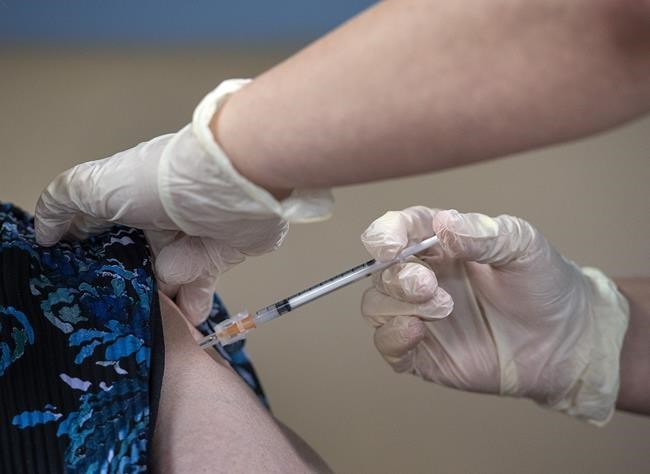Officials in several Canadian provinces expressed concerns Monday about the health network's ability to handle a rising tide of COVID-19 cases, with a senior Quebec health official warning that the province could soon face difficult choices about whom to treat.
Dr. Lucie Opatrny, an associate deputy minister in Quebec's Health Department, said hospitals across the province are at maximum capacity and struggling to keep up even with cancer and emergency surgeries.
At a news conference alongside Premier Francois Legault, she said hospitals are being forced to delay more and more surgeries and treatments, creating a backlog that she said could last "months or even years."
Worse, she said the network was preparing for the possibility of having to use its protocol of prioritizing access to intensive care — essentially deciding which seriously ill patients get treated first if it becomes impossible to help them all.
"It was an exercise we told ourselves was purely hypothetical just a few months ago," she said, but now it is increasingly likely the protocol will be invoked in the coming weeks if trends don't improve. She said every effort would be made to avoid that scenario.
Ontario Premier Doug Ford also confirmed additional restrictions would be announced on Tuesday in light of dire new COVID-19 projections that are set to be made public, as Toronto Mayor John Tory called for a return to a full lockdown similar to what was imposed last spring.
The province's death toll surpassed 5,000 after 29 more deaths were attributed to the novel coronavirus on Monday — along with 3,338 new cases and 80 additional COVID-related hospitalizations.
While there had been speculation that Ontario would follow Quebec's lead in imposing a curfew, senior government sources with knowledge of the measures being considered confirmed Monday that a curfew was not part of the public health recommendations.
Quebec, which has reported a Canada-high 8,737 deaths, reported 1,869 new infections and 56 more COVID-related hospitalizations Monday.
Legault said that while the situation in hospitals was "critical," there was also some good news: the vaccination campaign is almost halfway to its target vaccination rate in long-term care homes, he said, and the test positivity rate had declined slightly, to about seven per cent.
He said most Quebecers respected the 8 p.m. to 5 a.m. curfew that came into effect over the weekend in order to limit transmission and ease the burden on the health-care system.
Canada's chief public health officer said hospitalizations and deaths are still rising across the country. About 4,336 people were being treated in Canadian hospitals each day last week, with an average of 811 in intensive care, Dr. Theresa Tam said in a statement Monday.
"This situation continues to burden local health-care resources, particularly in areas where infection rates are highest," she wrote. "These impacts affect everyone, as the health-care workforce and health system bear a heavy strain, important elective medical procedures are delayed or postponed, adding to pre-existing backlogs."
The news was more positive on the economic front, as the leaders of Canada’s top banks expressed confidence that an economic rebound is on the horizon, especially given the arrival of promising vaccines.
However, the consensus at the Royal Bank of Canada's Canadian Bank CEO conference was that things will remain difficult in the short term as COVID-19 numbers continue to rise.
Royal Bank of Canada chief executive Dave McKay said the economy could likely be reopened when between 4 million and 4.5 million high-risk Canadians have been vaccinated against the virus. But some sectors of the economy, including small businesses, hospitality businesses and transportation companies, are likely to take longer to recover.
While the COVID-19 situation remained serious across the country, there were glimmers of good news.
Newfoundland and Labrador and Manitoba both announced they'd begun inoculating residents in remote Indigenous communities on Monday, while Nova Scotia expanded the first phase of its immunization program to reach more vulnerable residents in long-term care and health-care workers outside Halifax.
Manitoba reported 133 new daily COVID-19 cases, down from 400 at the height of the fall spike, prompting the province's chief public health officer to say the restrictions in place to limit transmission appeared to be working. However, Dr. Brent Roussin said hospitals remain strained and more time is needed to get COVID-19 numbers down further.
Alberta had another decrease in new daily cases with 639, while Saskatchewan's infections continued to grow with 412 — bringing its weekly average of new daily cases to 307, the highest since last summer.
British Columbia recorded 22 more deaths from COVID-19 over a three-day period, pushing its death toll to 1,010, as the province also announced an additional 1,475 cases.
Nunavut said it would lift restrictions on the last two communities under lockdown after two weeks without a new case.
— With files from Shawn Jeffords, Tara Deschamps and Steve Lambert
This report by The Canadian Press was first published Jan. 11, 2021.
Morgan Lowrie, The Canadian Press



